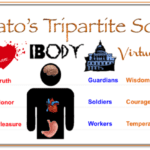Aristotle’s Nicomachean Ethics Book I
Chapter 1 – What are Goods?
There are many ends or goods because each work, art, inquiry has an end its directed to and these ends are all for a telos/good.
Every action that a human being does is for the sake of some good they have in mind, and so it is correct to say that the good is that at which all things aim. (Just as by this thing being red, and this thing being blue, they both have color, so too this thing aiming at sex and that thing aiming at food are aiming at the good. See quantifier shift comments below((*There is debate over whether Aristotle commits quantifier shift fallacy by inferring that if each art has a good at which it aims, then there is some one single good at which all things aim. But that is not the point he is making as I made somewhat clear above. He is not saying there is a single determinate good at which all things are aiming, but just that they are aiming at what appears good to then – the way they imagine it in generally. That they share what they imagine to be good in virtue of being human, can’t be accidental.
Second, he is accused later of inferring that there must be a single determinate good, since our practical reasoning and deliberations for what is good can’t be in vain and must stop somewhere. But this also is not a clear presentation of what he is “aiming” at. But this would be ridiculous, since it would just be restating the the last controversial passage. Aristotle isn’t that dumb. He is just claiming that there must be an end at which all things aim generally, since all desire would be in vain is another way of saying that all practical reasoning must come to an end. Most of the rest of the book is about specifying what this actually is.))).
Chapter 2 What is the Supreme Good?
The end of ethics is political science. If there is a chief good for all our actions, and if political science determines what things are studied, learned, and how much, then political science will include the end of all the other sciences.
Political science is directed toward the good of man because man’s order of deliberation must have and end (can’t go on indefinitely), and political science is directed towards discovering it but is ultimately put in practice by individuals with habits…not mere knowledge.
Chapter 3 – What is the method for studying Political Science?
It is the mark of an educated man to expect the amount of exactness for the nature of each subject. It would be stupid to accept mere opinion/doxa for mathematical conclusions, just as it would be stupid to demand strict scientific demonstrations from an orator. This supports his introduction because, when he says that all things have an end at which they aim, he is not supposing that he knows what these ends or this end is: it may be shared by all things, or each thing may have its own unique end.
He also states that the young are not fit for studying ethics, because each person typically judges correctly in those matters with which he is already acquainted. Since “first principle” can be said in two ways: the starting point – what is most known relative to the learner, and the term – what is most knowable in itself (the truth), and since experience with good actions is the starting point of leading someone toward moral life, then it is better to have a student who has experience doing good things (a better starting point) so that he is further ahead in the science. You won’t need to explain quite as much to him. Since the youth don’t have much life experience to see what actions cause happiness in the long run and which don’t, they don’t easily accept what might be obvious premises to adults. And since they tend to yield to passion rather than reason, even if they did see the truth of the conclusion, they may not even be able to apply the truth anyways.
We shouldn’t expect too much exactness in the science since it is only able to laydown principles from which people will need to draw conclusions. But the principles should be more known relative to us and therefore those studying the science ought to have experience with good human action and be able to control themselves.
Chapter 4 – What is Happiness?
Everyone pursues wealth, pleasure, or honor for the sake of doing well. We call this happiness. But people are disagreed on what it is.
Start with older opinions and move from knowable to us to knowable in itself type conceptions. Everyone in the past has agreed that happiness is the highest good, But disagrees in specification because not everyone is a good judge. They have not advanced from what is most obviously good (sense pleasure).
Chapter 5 – Is Happiness in the money-making, political, or contemplative life?
Not money-making. Not political because honor is for virtue and virtue isn’t with us always. Contemplation considered later.
Chapter 6 – Is it a Universal/Ideal Good?
Idea of good isn’t relevant to ethics (bcs unattainable, and useless apart from material consideration). There’s not one idea of good applying equal lead to the separate good into human happiness univocally because good in the sense of substances/God is different from good in the sense of quality/us and because there are different sciences there are different goods.
Chapter 7 – What is the Supreme Practical Good?
In Ch. 2 Aristotle said the good is “that at which all things aim,” and gave a brief summary of his argument: If there be something which is self sufficiently good, and if nothing else is wanted besides it, this is the supreme good. This chapter expands on that.
He proposes another way to reach the same conclusion about good as Ch. 2: “that for the sake of which everything else is done.”
- Every art has a different good: health, house-building, victory, etc.
- In each case, this good is describing the end of the art.
- So if there is an end shared by all of them, this one, or the combination of the many will be the ultimate good: “that for the sake of which everything else is done.” (happiness appears to be this type of end since it is always for its own sake and not a means to something else, but it is not yet identified with the ultimate good we just arrived at)
Now he tries to make it more precise (?):
- Of these ends – not all of them are final. It must be a final end. (isn’t that just stated above?
- It must be a self sufficient end (standing by itself renders life desirable and lacking nothing)
- So happiness as final and self sufficient – is the end at which all actions aim.
It might seem obvious that the supreme good is happiness already, but we need a more explicit tying of the two.
Happiness is the active exercise of soul’s faculties/powers in conformity with excellence or virtue, or if there be many, then in conformity with the best among them.
-
Repeat the conclusion: happiness to must be the goods achievable in action
-
The ultimate end must be complete(nothing soft beyond it) and self-sufficient (not the same as solitary-we need others), because it is the end of the things achievable in action
-
Happiness is the activity of the soul in accord with virtue(Best or more faculties) because
-
There is a function man has since a) it would be weird for mans function to come from that role he is assigned as a flute player or actor and b) the parts of man have a function like the eye and foot so the whole should also.
-
This function is predicated of the activity proper to humans(Reason, not sense or vegetation)
-
Therefore this function is the life of action of the part of the soul with reason – either listening to it by moral virtue, or using it by contemplation and study
-
- This also requires a complete life and sometimes people learn bye induction perception habituation or others and never know the “why,” only the”that”
Chapter 8 – Does this definition harmonize with earlier opinions?
The goods were divided into external goods, body and soul. Since a good soul would cause all these things, this definition supports the soul(To be explained), virtue because it is an ongoing thing not a trophy, and pleasure because what you love, even if it is virtue, is pleasant. Also it accords with pleasure because the virtuous person does what is pleasant itself-it’s not a thing on top/superadded (Pleasure is an activity not rest). Last it supports pleasure also because there is a unity between the good of the soul and the pleasant because the virtuous person judges rightly while most don’t desire what is pleasant by nature and have conflicts within their beating, and if someone didn’t enjoy being just, People wouldn’t call him and just person. There is an agreement between the kinds of goods-Even external goods-which are necessary for exercising virtue too.
Yes, because accords with virtue, pleasure, and nobility.
Chapter 9 – Does Happiness depend on fortune?
Happiness is achieved either through God, Humans (which could cause it by learning, habits, or cultivation), or fortune. God does cause happiness but that belongs to theology. Humans cause their happiness as a participation in the Divine and this is available to everyone. Fortune does not cause happiness because the best does not happen by accident and because if that were the case, we couldn’t cause it ourselves by aiming at it. Happiness also requires a complete life.
Divine gives fortune, but virtue is divine-like, it admits of being diffused since people can learn, and there is not reason to leave it to fortune when you have a brain.
Chapter 10 – Is anyone happy while living?
Misfortune or good luck cannot make a lasting change in someone’s life because it is external, and the internal principle of action helps him never do evil or base actions. Maps
A virtuous man can be slightly affected by misfortune but it cannot take happiness away from him.
Chapter 11 – Can a man be happy after death?
Man can be happy after death since it is such a stable state even though he might be mildly affected by the successes of his progeny.
It would be strange to think he would be unaffected, but also strange to think he would be strongly affected by his descendants.
Chapter 12 – Do we praise or do we honor virtue?
We praise persons/virtues because of their acts. But the acts themselves are honored. The things that are beyond praise like acts and gods, we honor. Good acts are like gods and deserve more than praise.
Chapter 13 – What is the nature of goodness itself?
There are two parts of the soul: and nonrational part which is shared with all life, And parts obedient to reason but still able to rebel (desire) of various types. Therefore there are different types of virtue. Ruling his prudence, Well temperance encouragement and generosity for the lower parts. Therefore making reason good will make a man good.
There are various parts of the soul which are principles of action in different ways, but they are united in the reason – the primary means of action.




